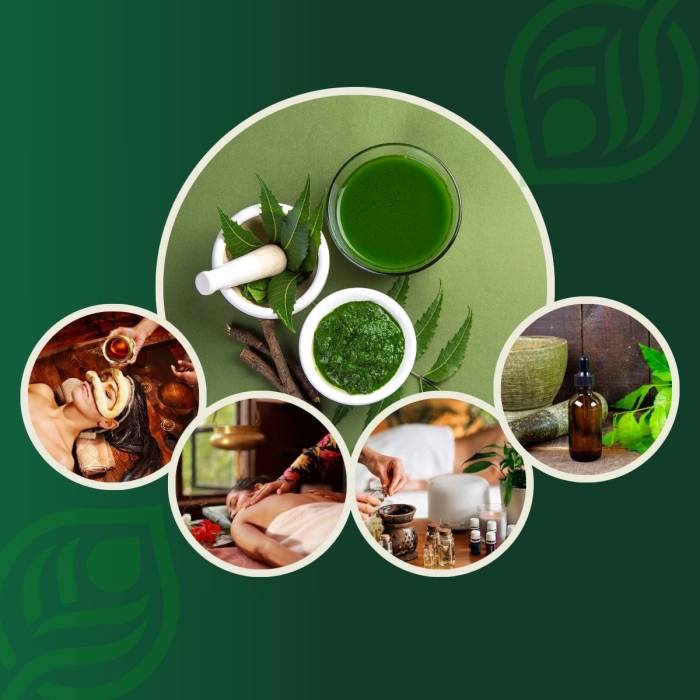
Ayurvedic treatment is an ancient healing system rooted in the belief that health and wellness depend on a delicate balance between the mind, body, and spirit. It offers a unique perspective on health that is distinct from conventional medicine, emphasizing personalized care and natural therapies. Through its rich tapestry of herbal remedies, yoga, and dietary practices, Ayurveda addresses not just the symptoms but the underlying causes of health issues, making it a holistic approach to wellness.
In this exploration of Ayurvedic treatment, we will delve into its fundamental principles, various therapies, and its application in women’s health and mental well-being. Whether you’re seeking to balance hormones, support emotional health, or integrate Ayurvedic practices into your life, this guide provides valuable insights and practical information to help you navigate this holistic path.
Ayurvedic Treatment Overview
Ayurvedic treatment is an ancient holistic healing system that originated in India over 3,000 years ago. It is based on the belief that health and wellness depend on a delicate balance between the mind, body, and spirit. Unlike conventional medicine, which often focuses on treating specific symptoms, Ayurveda aims to address the root causes of health issues by promoting harmony within the body.The fundamental principles of Ayurvedic treatment revolve around the concept of the three doshas—Vata, Pitta, and Kapha.
These doshas represent different combinations of the five elements: earth, water, fire, air, and space. Each person has a unique dosha constitution that determines their physical and mental characteristics. Ayurvedic practices seek to restore balance to these doshas through diet, lifestyle changes, herbal remedies, and various therapies.
Types of Ayurvedic Therapies
Ayurvedic treatment encompasses a variety of therapies designed to promote healing and balance. Each therapy serves a specific purpose and can be tailored to meet individual needs. Here are some common types of Ayurvedic therapies:
- Panchakarma: This is a detoxification process that involves five actions (or therapies) aimed at cleansing the body of toxins (ama) and restoring doshic balance. It includes therapies such as Vamana (therapeutic vomiting), Virechana (purging), and Basti (enema).
- Abhyanga: A traditional full-body oil massage that uses specific herbal oils tailored to the individual’s dosha. This therapy promotes relaxation, enhances circulation, and nourishes the skin.
- Shirodhara: This involves pouring warm herbal oil over the forehead in a continuous stream. It is beneficial for calming the mind, reducing stress, and improving mental clarity.
- Nasya: A nasal therapy that involves administering herbal oils or powders through the nostrils. It is particularly effective for respiratory health and mental clarity.
- Swedana: A therapeutic sweating process that helps to open up the channels of circulation and release toxins from the body.
Ayurveda distinguishes itself from conventional medicine in several key ways. While modern medicine often emphasizes pharmacological treatments and surgical interventions, Ayurveda promotes natural healing through lifestyle adjustments, dietary practices, and herbal formulations. Additionally, Ayurvedic practitioners assess patients holistically, taking into account emotional, mental, and spiritual well-being alongside physical health. This comprehensive approach fosters a deeper understanding of the individual’s health and promotes long-term wellness rather than merely alleviating symptoms.
“Ayurveda is the science of life; it teaches us to live in harmony with nature and ourselves.”
Ayurvedic Treatment in Women’s Health
Ayurveda offers a holistic approach to women’s health, focusing on the intricate balance of hormones and overall well-being. This ancient system of medicine provides targeted treatments that can effectively address various stages of a woman’s life, from puberty to menopause, and beyond. By understanding the unique constitution of each individual, Ayurveda tailors its treatments to promote optimal reproductive health and hormonal balance.
Ayurvedic Treatments for Hormonal Balance and Reproductive Health
Ayurvedic practices for hormonal balance involve a combination of dietary recommendations, herbal remedies, and lifestyle adjustments. These treatments are designed to restore the natural rhythm of the body’s hormones. Key components include:
- Herbs: Adaptogens like Ashwagandha and Shatavari are commonly used to support hormonal balance. Ashwagandha helps reduce stress and cortisol levels, while Shatavari is known to nourish the female reproductive system.
- Diet: A Sattvic diet, rich in whole grains, fresh fruits, and vegetables, is recommended to promote balance. Foods like ghee, nuts, and seeds can also help in nourishing the body.
- Lifestyle Practices: Daily routines, including yoga and meditation, are integral to Ayurveda. They assist in reducing stress and enhancing overall well-being, which is vital for hormonal health.
Ayurveda’s Support for Pregnancy and Postpartum Recovery
During pregnancy and postpartum, Ayurveda emphasizes nurturing the mother and child. It offers specific guidelines to ensure a healthy gestation and recovery phase. Important practices include:
- Nutrition: Pregnant women are encouraged to consume warm, nourishing meals. Dishes made with ingredients like ginger, turmeric, and garlic are believed to enhance digestion and provide the necessary nutrients.
- Herbal Support: Herbs such as Guduchi and Moringa are recommended for their nutritional value and immune-boosting properties, which can aid in a healthy pregnancy.
- Postpartum Care: After childbirth, Ayurvedic practices include the use of warm oils for massage to promote healing and relaxation. This can help in restoring energy levels and balancing hormones.
Menopause Management in Ayurveda Compared to Conventional Approaches
Menopause can be a challenging phase for many women, and Ayurveda provides a comprehensive approach to manage its symptoms. Unlike conventional methods that often rely on hormone replacement therapy, Ayurvedic treatments focus on natural remedies and lifestyle modifications to ease the transition.
- Herbal Remedies: Ayurvedic herbs such as Brahmi and Ashwagandha help manage symptoms like anxiety and hot flashes by calming the mind and balancing hormones.
- Dietary Adjustments: Incorporating foods rich in phytoestrogens, like flaxseeds and soy products, can support hormonal balance during menopause.
- Mind-Body Practices: Techniques like yoga and meditation are emphasized in Ayurveda to manage stress and promote emotional well-being during this transitional phase.
“Embracing Ayurveda during menopause not only addresses symptoms but also fosters a sense of empowerment and connection to one’s body.”
Through these tailored approaches, Ayurveda not only addresses women’s health concerns but also empowers women to take charge of their health and well-being throughout different life stages.
Integrating Ayurvedic Treatment with Mental Health

Ayurveda, the ancient system of medicine from India, offers a holistic approach to mental health that emphasizes balance and harmony within the body and mind. With its focus on individualized treatment, Ayurveda provides valuable strategies for managing stress and enhancing emotional well-being. As modern life becomes increasingly demanding, integrating Ayurvedic principles with contemporary therapy can lead to profound improvements in mental health.Ayurveda views mental health through the lens of balance among the three doshas—Vata, Pitta, and Kapha.
Each dosha influences not only physical health but emotional states as well. When these doshas are out of balance, it can lead to stress, anxiety, and depression. By aligning our lifestyle and dietary choices with Ayurvedic practices, we can cultivate a more stable mental state and improve our overall well-being.
Ayurvedic Herbs and Practices for Emotional Balance
Several Ayurvedic herbs and lifestyle practices are renowned for their ability to support mental health and promote emotional stability. Incorporating these elements into daily life can create a strong foundation for resilience against stress and anxiety.
- Ashwagandha: Known as a powerful adaptogen, ashwagandha helps the body adapt to stress and promotes a sense of calm. It can reduce cortisol levels and mitigate symptoms of anxiety.
- Brahmi: This herb is revered for its cognitive-enhancing properties. Brahmi supports memory, concentration, and overall mental clarity, making it a great choice for those feeling overwhelmed.
- Turmeric: With its anti-inflammatory and antioxidant properties, turmeric not only benefits physical health but also supports mental clarity and emotional well-being.
- Holy Basil (Tulsi): An adaptogen that helps to balance stress hormones, holy basil supports emotional resilience and combats feelings of anxiety.
- Yoga and Meditation: Practicing yoga and meditation can significantly enhance mental health. These practices foster mindfulness, reduce stress, and promote relaxation.
Incorporating these herbs and practices into daily routines can foster emotional equilibrium and serve as natural complements to modern mental health therapies.
Combining Ayurvedic Lifestyle Changes with Modern Therapy Techniques
The integration of Ayurvedic principles with contemporary therapeutic practices can create a comprehensive approach to mental health. Here’s a guide to merging these two paradigms effectively:
1. Daily Routine (Dinacharya)
Establishing a consistent daily routine that includes regular sleep, meal times, and self-care practices can enhance mental stability.
2. Mindful Eating
Following an Ayurvedic diet that emphasizes whole, seasonal foods while being mindful of portion sizes can positively affect mood and cognitive function.
3. Therapeutic Practices
Engage in yoga or meditation as a part of therapy sessions. This integration can deepen relaxation and promote emotional release during therapy.
4. Consultation with Professionals
Collaborate with both Ayurvedic practitioners and mental health professionals to create a personalized treatment plan that addresses both physical and emotional needs.
5. Journaling
Combining traditional journaling with Ayurvedic insights can help process emotions and document personal growth, enhancing self-awareness.A holistic approach that integrates Ayurveda with modern therapy techniques can lead to a more profound transformation in mental health, enabling individuals to thrive in both personal and professional realms.
“Integrating lifestyle changes with therapeutic techniques creates a symbiotic relationship that enhances emotional and mental well-being.”
Last Point

In conclusion, Ayurvedic treatment stands as a testament to the power of natural healing and holistic care. By understanding its principles and applications, individuals can harness the benefits of this ancient practice to enhance their health and well-being. Whether through specific therapies targeting women’s health or integrating Ayurveda with mental health strategies, the journey towards a balanced life is both enriching and transformative.
Embracing Ayurveda could be the key to unlocking a healthier, more harmonious existence.
FAQ Compilation
What is Ayurveda?
Ayurveda is a traditional Indian healing system that aims to balance the body, mind, and spirit through natural therapies and lifestyle changes.
How does Ayurveda differ from modern medicine?
While modern medicine often focuses on treating symptoms, Ayurveda seeks to address the root causes of health issues through a holistic approach.
Can Ayurvedic treatment be used alongside conventional medicine?
Yes, many people safely integrate Ayurvedic practices with conventional treatments, but it’s important to consult with healthcare providers before doing so.
Are there any side effects of Ayurvedic herbs?
While Ayurvedic herbs are generally safe, some may cause side effects or interact with medications, so it’s advisable to use them under professional guidance.
How can I start incorporating Ayurveda into my life?
You can start by adopting Ayurvedic dietary principles, practicing yoga, and incorporating herbal remedies that suit your body type or dosha.





